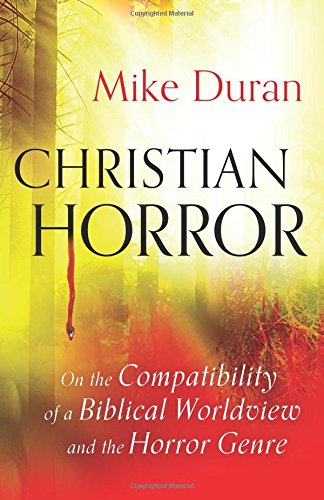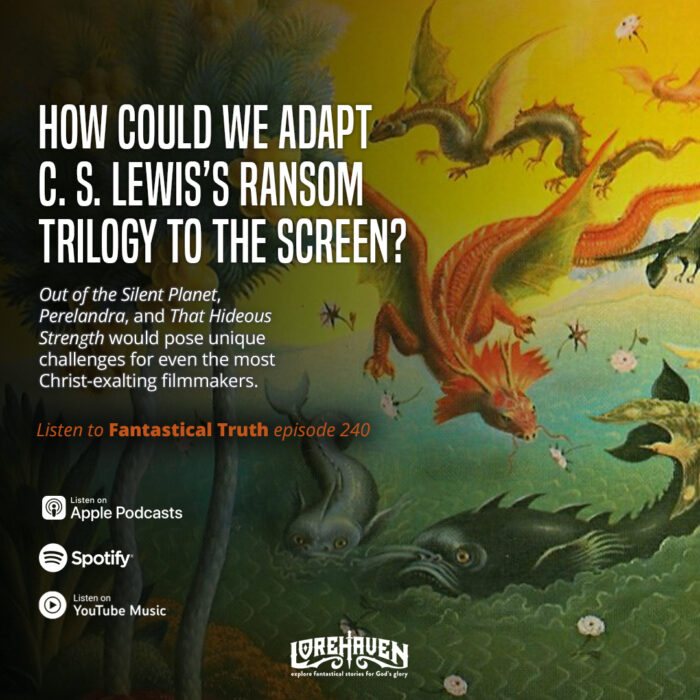How Not To Promote Christian Speculative Stories
Speculative Faith exists to explore epic, fantastical stories for God’s glory. This means we want to see more Christian speculative stories1 that exalt God through their excellent craft and content.
Perhaps you do not share this goal. Perhaps you’ve recently arrived here from the Mirror Universe, in which fantasy, science fiction, and supernatural/horror novels dominate Christian-owned publishing, but you would prefer more Amish and romance stories.2
In that case, here are seven ways you can keep Christian speculative genres from growing.
 1. Only explore the ‘why’ of these genres
1. Only explore the ‘why’ of these genres
Many SpecFaith articles provide an “apologetics” approach for why Christians can enjoy, explore, and create science fiction, fantasy, and supernatural/horror fiction.
Now, let’s only do that for this generation and beyond. Only rehash the basics of this “gospel” as a mere protest against the “sin” of not appreciating these genres. Never go further, into assuming readers agree with these things so we can explore deeper matters.
2. Never explore the ‘why’ of these genres
On the other hand, we can also assume that the wide majority of readers already agree we need to have Christians plowing the fantastical fiction fields. Let’s never discuss the why, that is, the reasons Christians should enjoy these genres. Using God’s word to ensure we’re convinced in our own minds about what we do3 is overrated anyway.

Also, you can ignore the approach of books like this one. Instead, pretend Christians have always been okay with horror.
3. Avoid the fictional magic issue
Last week I started a Do You Believe Christians Can Enjoy Fictional Magic? question and poll (which is ongoing). Most readers answered yes, they do believe Christians can enjoy magic in stories, though they offered different reasons. Fewer readers answered no, also for different reasons. But one poll response sandwiched in between got my attention:
I find this whole “fictional magic” debate strange or unnecessary.
Indeed this may seem a strange debate. But if we want to keep Christian fantasy from growing as a genre, we’ll make sure to avoid that debate entirely. We’ll act like all those news-making “Halloween and Harry Potter are evil” controversies never happened. That way, we can make sure our anti-magic Christian neighbors believe we’re falling into real evils, and also make sure our non-Christian neighbors think we’re trying to cover something up.
4. Only encourage excellent content or craft
A weak movement for Christian-made speculative stories has room only for either:
- Fandoms, groups, and websites that push for speculative stories with better craft.
Example A: We could only explore ways to include realistic content in stories, partly so Christianity critics are impressed, such as bad words, violence, and sexual situations.4 On the way, we might ignore some Christian authors’ inability to, say, add curse words to fiction in a realistic manner, because that is not our native language.
Example B: We could discuss writerly jargon, marketing, and other industry procedures that are helpful only to aspiring authors—thereby making the niche even niche-ier.
- Fandoms, etc., that push for speculative stories with better content, e.g. truth themes.
Example A: Instead of saying “Christian stories should implicitly acknowledge biblical truths about God’s nature on the way to the actual story, which is about flawed human beings,” we should insist that humans in stories become carriers to advance a particular doctrine or Bible study topic. (See many evangelical inspirational movies, such as this one.)
Example B: Or, like some critics of good biblical-history movies, be annoyed that a movie featuring Jesus does not explore everything doctrinal about him and his nature and gospel.

5. Imitate the DC vs. Marvel fandom fight
Another good way to keep Christian fantasy fandom from growing is this: help our fandoms imitate the Marvel vs. DC fan fights in geek-culture websites and comments sections.
Example A: If great Christian-made stories fail, possibly because of marketing missteps or just bad timing, you could lament about how C.S. Lewis and Tolkien never had this problem, or that it’s surely because the story is poorly made (like all Christian-made stories are).
Example B: Get behind one author, publisher, or approach to storytelling or publishing. Be a partisan for that author/publisher/approach. Condemn others who try different things, maybe because they’re too dark, too light, or only meant for particular readers (see below).
6. Only support Christian-published or crossover market stories
If you want to hinder the growth of Christian-made fantastical fiction, it would be great to take a side in a Christian Publishing Is Better versus Crossover Publishing is Better debate.
On either side, you can call the other side a [select one: compromiser / legalist].
On either side, you can call the other side a sellout because they would rather [select one: impress non-Christians than follow holiness / follow traditions than engage the world].
And on either side, you can say the other side limits the genre’s growth because [select one: they only market to nonbelievers who hate Christians and would never change / they only market to Christians who hate fantastical stories and would never change].
Above all, this strategy is an excellent way to keep Christians from uniting not only under their love for Jesus, but their love for fantastical stories that honor him and gift each other.
7. Neglect an eternal perspective
In all this, let’s make sure to neglect two truths. The first truth is absolutely biblical, and the second truth is a mix of biblical truth and biblically based speculation:
- Every single human being you have ever met, or will meet, will last forever.
- Good things on this planet, after purification by fire,5 will last forever. These good things will very likely include popular culture, which includes stories.
If we neglect these truths, we’ll opt for the companion half-truths or deceptions, such as:
- Stories and things that we personally enjoy are more important than human beings.
- Our eternity will not include stories or fantastical stories, so we only need to use them temporarily as some compensation for sin—not to bring glory to God forever.
By practicing these seven methods, you are sure to keep Christian-made fantasy, science fiction, horror/supernatural stories, and beyond from becoming an excellent, thriving, people-centered, and God-exalting genre. What other methods have you seen in action?
- By “Christian stories,” I mean stories made by Christians. A story is not a Christian. But Christians do intentionally imitate God’s role as Creator when they create stories. After Jesus returns, we will have a “Christian” universe, because everything there will, like us, point back to Him. ↩
- Sometimes I’m not convinced this isn’t the Mirror Universe. ↩
- Romans 14:5 ↩
- And, I would add, let’s not leave out explicit descriptions of passing bowel movements, because Realism. ↩
- 2 Peter 3:10. ↩










































I want to be sure to point out first I’m mostly in agreement with you. Points 1-4 and 7 are solid in my mind.
However, I’m not so sure about 6 and 7. The DC and Marvel turf war certainly hasn’t hurt comic book sales, has it? I mean, a self-identified Christian community feuding is probably not advisable because I don’t think that’s what Christ would want from us. But it isn’t necessarily true that splitting into camps will dampen growth. It doesn’t work that way for comic books.
Likewise with point 6. Being loyal to what you like, say the “crossover” approach, does not necessarily hurt the growth of other flavors of speculative fiction we can call “Christian.” While I would say it isn’t advisable to “diss” works that aren’t a person’s personal thing, it isn’t necessarily bad if we have divided camps with strong loyalties within them. As long as we can disagree in a civil manner…
So, again, great points, even though I don’t entirely agree on 5 and 6.
I would view “crossover” vs. “Christian” publishing “camps” as similar to denominations. It’s not wrong, and in fact can be very helpful, to group together based on those shared secondary interests. The only problem is when people let this natural bent or grouo-loyalty turn into a motive to condemn folks in other camps. We need to be all in this together, even while we are called to specific areas of influence!
When I look at #6, it is a shame that some people are “either-or” on this issue. I realize all readers have their preference as far as what they want their “Christian fiction” to be, but that is what it is, a preference. The other side should not be discounted. Unfortunately, some have gone as far and created litmus tests of what Christian art (books, film, music) must include to be considered Christian. A litmus test I recently saw discussed would most likely exclude some very popular Christian writers. One positive is that I think most Christian authors writing speculative fiction are not trying to write for one demographic or another. They are just trying to write their stories, and that is what all authors should do.
I find your use of what I’ll call “Reverse Logic” confusing and hard to follow.
I get that you’re trying to write this article in the vein of “The Screwtape Letters” or some such. But coming at your topics from the backwards/mirror is hard to follow. I have to turn every sentence 180 degrees around just to decypher your meaning, and I’m afraid most of it is getting lost in the translation.
Could you re-write this article from the perspective of saying what you actually mean (instead of saying the opposite of what you mean), and repost it tomorrow, or soon?